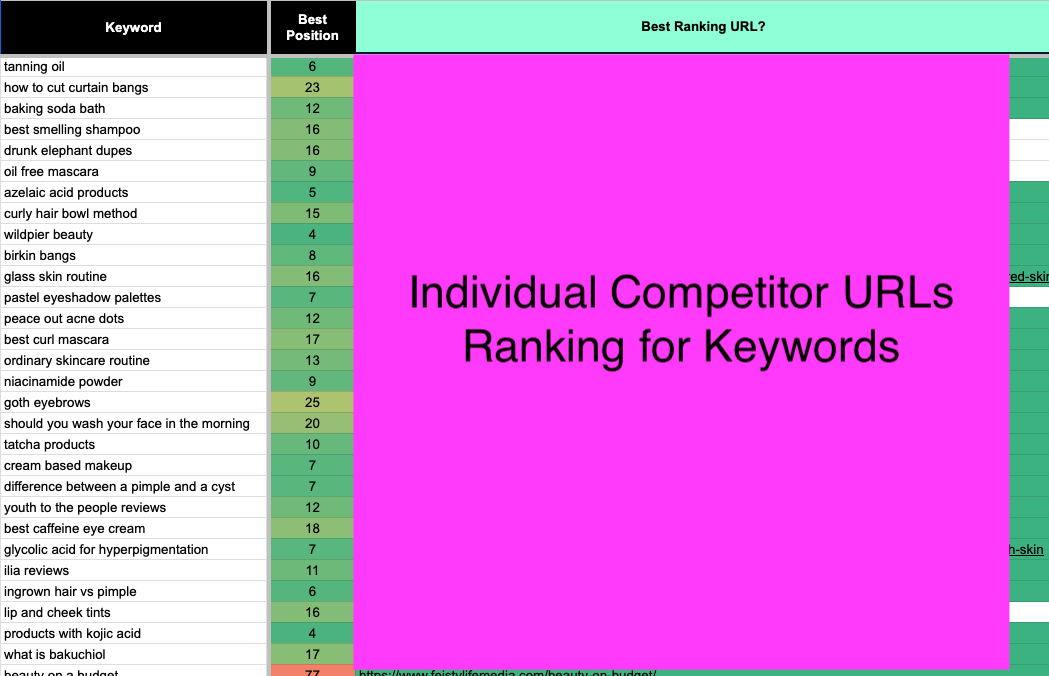Keyword and Competitor Analyses
When you're building your site, you're going to have competitors. These competitors will be attempting to rank for the same keywords as you, pushing your ranking below theirs. When this happens, your URL is less likely to be viewed, and you can miss out on traffic. That's why I put together these analyses following your website quality audit (WQA).
Competitor and Keyword Analyses
Analyzing Competitors' Keywords
Whether you supply me with your top 3-5 competitors, or need me to choose them for you, I'll complete an analysis showing which keywords they're ranking for - including keywords to "compete against."
There are four pieces of criteria used to determine which keywords are worth targeting:
- The search volume (aka, how many searches the specific keyword receives on average per month)
- The keyword difficulty (aka, how difficult it will be to rank for this keyword compared to other sites)
- The potential search traffic (aka, how much search traffic you could receive in the #1 spot)
- The top 10 sites ranking for a specific keyword (so we can see if they're a stronger site - think Ulta, or Forbes, or Elle - that's less likely to drop in ranking, or another blog with less authority on the topic)
The ideal keywords we target have a high search volume, low keyword difficulty, high potential search traffic, and less authoritative sites ranking in the top 10.
Sometimes, keywords are reported as having no search volume. This isn't always true! Covering certain topics can also build topical authority - basically, how knowledgeable your site is on the subject. I'll analyze any lower-to-zero-search-volume keywords and see if they have potential.
Pillars and Cornerstone Content
If your site has different topics, then there are built-in "pillars" to your site. For example, if you write about hyaluronic acid for dry skin on one article, and the best eyeshadow palettes for fall, you have two pillars: skincare, and makeup. Any skincare articles fall under the skincare pillar; the same goes for makeup articles in the makeup pillar.
You also might have cornerstone content: pages that aren't blogs, but instead key parts of information for your business. If your product is a game-changer because it has sunflower seed oil, then you may (should) have a page dedicated to why sunflower seed oil is so great. That page would be your cornerstone content.
Product pages can also be cornerstone content. Often, these will be your top-sellers, or the products you're hoping to sell the most of (such as recently-added products). You want these pages to be stars on your site - hello, sales and ROI! - and it's important to target the right keywords - ie., keywords that your customers are typing in to find products like yours.
Customer Journey
Different keywords have different intent. For example, someone would Google "what are false lashes" if they're looking for information on false lashes. This is somebody who's just beginning the customer journey - they're curious, but they aren't buying (yet).
Meanwhile, someone searching for "best wispy falsies" is looking at comparisons between different lashes. They're close to buying, but they want a little information.
Finally, someone who is typing in search terms like "wispy lashes" or "false lashes for almond shaped eyes" is most likely ready to buy.
This is where topical authority is important - you want to have every step along the customer journey covered on your website. You don't want them to leave for information on another site - you've gotta have it all!
In the end, you want to make sure your pages - especially product pages - rank for transactional keywords. And surprise, surprise: the higher the traffic to your pages, the higher the rankings, and the more likely your product pages will be found.
Other Factors To Consider
Looking into your data, you may have a search term that brings in most of your clicks. Building around these keywords is extremely important! Refreshing and re-writing content can often strengthen these pages.
Similarly, if a page has many impressions but few clicks, you can perform a keyword and competitor analysis for those specific keywords. It might not be worth targeting them, or your page may be irrelevant to the main intent of the keyword (think: "good foundation" - makeup term, or construction term?).



